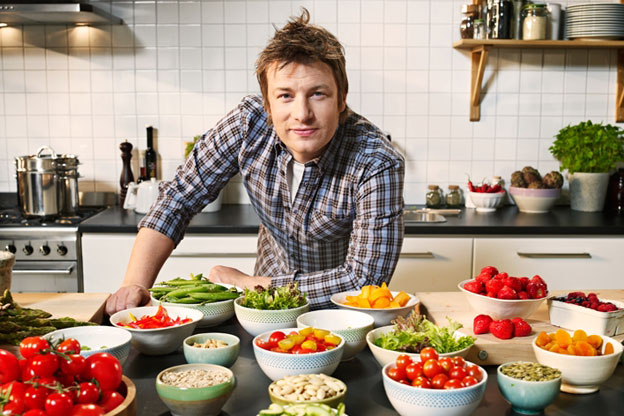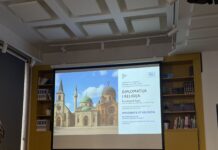By Francesco Buscemi
This work aims to investigate the gastrodiplomatic objectives of food travelogues on TV, and more precisely of the food travelogue Jamieʼs Great Britain, presented by the celebrity chef Jamie Oliver.
 Food travelogues are television programs in which the presenter, often a chef, travels around a country in search of good food, which in these programs is always inextricably connected to the landscape, popular sights, and the nation. These shows are aimed at representing good food and beautiful landscapes and, through its food, invite the viewer to enjoy the nation that they represent. In this sense, these programs are profoundly interrelated with tourism by having the same final aim of promoting the nation. While tourism achieves this by adopting multiple weapons, food travelogues only serve the purpose by representing food in the national context. The problem, then, is to find out how these programs represent food and the nation. Related to all of this, the research question that this work poses is to what extent and how do TV food travelogues, and more precisely Jamieʼs Great Britain, act as gastrodiplomatic texts?
Food travelogues are television programs in which the presenter, often a chef, travels around a country in search of good food, which in these programs is always inextricably connected to the landscape, popular sights, and the nation. These shows are aimed at representing good food and beautiful landscapes and, through its food, invite the viewer to enjoy the nation that they represent. In this sense, these programs are profoundly interrelated with tourism by having the same final aim of promoting the nation. While tourism achieves this by adopting multiple weapons, food travelogues only serve the purpose by representing food in the national context. The problem, then, is to find out how these programs represent food and the nation. Related to all of this, the research question that this work poses is to what extent and how do TV food travelogues, and more precisely Jamieʼs Great Britain, act as gastrodiplomatic texts?
In order to answer this question, the next section develops the relative theoretical framework.
Theoretical Framework
The Interaction Between Food and the Nation
In order to act as a text of gastrodiplomacy, these programs firstly need to reinforce the identity of the nation that they are promoting. To do so, they construct a mutual relationship between food and the nation. On the one hand, in fact, food “brands” the nation, for example when food helps to identify a common past for the whole state, or when shows represent dishes that are also national symbols. These phenomena in some sense guarantee the unity of the state, and promote the nation through a strong sense of identity. In Jamieʼs Great Britain, for example, Oliver cooks fish and chips in England and haggis in Scotland, two authentic symbols set in their birthplaces. In this case, food travelogues represent food to reinforce the nation.
On the other hand, sometimes it is the nation that brands foods, taking ownership of them and labelling them as “national.” Belasco has already demonstrated that national food is only a social construction.1 Food, in fact, naturally comes from regions, local areas, or, on the contrary, from globalization, thanks to the creolization of ingredients and dishes. When defined as national, an item of food is instead a social construction that has undergone a social and political process of inclusion/exclusion,2 and continually negotiates its presence within the constructed national food culture. As the nation is a social construction,3 it never expresses food naturally. It is the state that needs to have national foods to appear unified by a so-called “natural element.” Related to this, Olwig finds that the representation of a natural element is more powerful than that of a socially constructed entity. If, moreover, there is also an ideological aim behind this representation, the natural entity results in being more convincing. In Olwig this happens with landscapes, represented to reinforce national identity. However, this study states that also food may be represented with the same aim, because representing and stressing the natural “provide a source of human identity”4 and it does not matter whether or not this naturalness is real. In fact, food in travelogues appears to be almost exclusively natural, with every sign of processing being carefully avoided. Natural food is more convincing when used in gastrodiplomacy. Similarly, even the nation is represented as natural, as composed of an ancestrally unified people, and not as a politically and socially constructed entity. This authenticity, however, is only the representation of authenticity, which “can become a fake in the course of increasing commodification”5 leading to an “illusion of authenticity.”6 Therefore, to represent this illusion, television needs simulacra.
Simulacra
Stringfellow et al., whose work is of direct importance for this study, start from the point that today, in the post modern and liquid society,7 members of the audience do not consume objects but simulacra,8 which for Baudrillard are “models or signs that simulate reality and thus conceal the fact that the real is not real.”9 Relating this theory to tourism, Stringfellow et al. argue that consumers do not consume destinations, but simulacra in the form of celebrity. Similarly, in the case of food TV, it may be assumed that simulacra substitute expensive or unattainable foods for consumers that cannot afford or attain them. Who will eat the veal cooked by Oliver in person? Who will visit the small house by the river of the Scottish fisherman, as Oliver does in one of the episodes? Just Oliver, and other individuals that hold the status of celebrity. The members of Oliver ʼs audience, instead, are not allowed to do so, not only for economic and social reasons, but also because there are too many of them to visit these small, exclusive locations. In this sense, simulacra may “meet ever-increasing consumption demands.”10 After enjoying food and the landscape on TV, members of the audience may buy the food promoted by Oliver at the supermarket and visit Britain on an organized tour, experiencing only the simulacra that they watched before.
In this sense, these shows do not promote the nation through food, but a simulacrum of the nation through the simulacra of its food, producing a televisual representation that is perfectly consistent with the kind of tourism it relates to. Finally, not only do members of the audience fail in reaching a higher status, but also they have to deal with the ideological assumptions that all of this implies.
Ideology
Many texts relating to food and the nation not only bear a representation of the nation, but also national ideologies.11 In the case of Britain, as in many democracies, this ideology is put forward without any formal imposition, but through the softer weapon of hegemony.12 When talking about food and Britain, the ideologies are multiculturalism and post colonialism. Multiculturalism, as opposed to nationalism, refers to a society “at ease with the rich tapestry of human life and the desire among people to express their own identity in the manner they see fit.”13 Post colonialism, instead, sees that the roles of the two actors, the colonized and the colonizers, must be re-written, “for the analysis of postcolonial discourse as a productive, hybrid ‘betweenness’, relocation and re-inscription.”14 Addressing the west and the east, “Bhabha shows how such polarization is simplistic and dangerous … Colonialism conditions the world in which we live in complex ways. But we cannot explain this by dividing the world into the good (the formerly oppressed) and the bad (the former oppressors).” 15
In conclusion, in watching the show, members of the audience also deal with the ideologies that national televisions put forward, and this brings about a new form of interaction between the show and the viewer, who may absorb or challenge these ideologies to various degrees. The focus of this work, however, is the relationships between food and the nation and the creation of simulacra in order to deal with the increasing consumption demand and to promote the nation. Supported by all of the theories reported above, the next section analyzes Jamieʼs Great Britain and its representation of food, relating to this form of gastrodiplomacy of the simulacra.
Jamieʼs Great Britain
Throughout the six episodes of Jamieʼs Great Britain, the celebrity chef Jamie Oliver travels through Britain, cooking and tasting traditional and ethnic British foods. In following the theoretical framework, this analysis is split into two parts. The first part discusses the scenes in which food brands the nation while second section concerns the parts of the show in which the nation brands food. Both parts deal with issues that, as expressed in the theoretical framework, relate to ideology and simulacra.
When Food Brands the Nation
In Jamieʼs Great Britain, authenticity is the strategy through which food brands the nation. In so doing, the show acts as a means of cultural diplomacy. In representing the authenticity of British food, Oliver promotes the authenticity of the nation. Authenticity is represented by Oliver in multiple ways, all relating to adjectives like real, unprocessed, tough, and spartan. In one word, authentic. One of the most frequent of these is the way in which the show represents meat. Throughout the episodes, Oliver often shows scenes of slaughter, killing of animals, and hanging dead corpses of rabbits and birds. Moreover, in one scene, which he defines as similar to an autopsy, he removes, cooks, and eats all the inner organs of veal. These scenes go together with the use of the adjective chef-y, which relates to the chefʼs elegant and refined way of cooking. Oliver continually repeats, while cooking, that what he is preparing is not chef-y, and there is nothing chef-y about his technique. In forgetting that he is one of the celebrity chefs par excellence, he distances himself from his colleagues and from elegant styles of cooking, often eating with his hands and continually using sexual double entendres. All of this adds authenticity to Britain, which is in fact socially constructed. The rural landscape, hard work, the hanging of dead animals, and tough behavior promote Britain as an apparently “real” country, in which travelers may experience things which are less common on todayʼs organized trips (and on todayʼs TV). Actually, as seen above, few members of the audience will be allowed to eat oysters on an old boat on the river or share memories of the old East End with the owner of the oldest pub in London, as Oliver does. The majority of them will just experience the simulacra represented in the show.
However, the most important means through which Oliver constructs authenticity is the army truck he travels around Britain and cooks in. The show highlights the role of the army truck by showing Oliver travel around inside it as he moves from place to place across the British countryside. The result is the suggestion that Oliverʼs army truck is visiting every corner of Britain, and in a sense holding the nation together, as “the spatial landscape ideologies are imagined as enduring spaces, spaces forged over millennia through the sacrifice of blood and toil.”16 In driving an army truck, in fact, Oliver plays the role of the soldier, and soldiers are part of the process of the construction of a nation.17 Thus, as a soldier, Oliver fights for the success of his gastrodiplomatic mission. Finally, the wooden kitchen in the rear of the truck and the old and spartan utensils (none made of stainless steel and all of them with traditional shapes) reflect the image of Oliverʼs toughness and help the image of the chef-y celebrity chef to disappear forever.
Another element that guarantees the unity of the nation and reinforces its identity is the idea of a common past.18 As a gastrodiplomatic means, Oliverʼs show represents how food gives the nation a common past. The resulting Britain is therefore a unified state that the viewers may apparently go around and take hold of, just as the celebrity chef does. In Jamieʼs Great Britain, this strategy is adopted when Oliver goes to Scotland and underlines the problem of Scotlandʼs position within the U.K., and the desire of a part of this people to be independent from the rest of the U.K.. Oliver hints at Scottish pride and the desire for independence, and he cooks Scottish food. However, when he goes to hunt and praises the game that he cooks and eats, he says that England, Scotland, and Wales “as a whole”19 have the best game in the world, that “whole” meaning the state. Moreover, when it comes to finding the very origin of Scottish food, he says that it comes from the Vikings. The Vikings were certainly primordial in the construction of the nation, but primordial to which nation? They invaded England, Scotland, Wales, and Ireland (and many other countries) from the 790s onward20 and “the Viking kingdom(s) in Britain gave way to the newly founded kingdoms of Scotland, Wales, and England.”21 Thus, Vikings are not primordial to the nation of Scotland, but to that of the United Kingdom. In doing all of this, Oliver actually recognizes the diversity of Scotland without calling into discussion the unity of the U.K. This scene, therefore, also underlines the ideological assumption that the U.K. is an indivisible state. A national broadcaster, Channel 4, has been guaranteeing the inviolability of the nation. The branding of the nation through food, however, is not the only interaction between food and the nation in the show. The next section analyses its counter-process.
When the Nation Brands the Food
Since Mauss published The Gift,22 it has been widely acknowledged that any form of giving has its reciprocation. This scheme may be applied to what happens between food and the nation on TV shows that have a gastrodiplomatic aim. If, on one hand, food brands the nation in order to promote the state at its best, the nation, on the other hand, takes ownership of some of the represented food, labelling it as national. As said in the theoretical framework, this national food is only a social construction and a simulacrum, certainly helpful for the nation. In Jamieʼs Great Britain, Oliver leaves out the idea of including/excluding regional foods in order to create British food. Instead, he constructs British food as made up of items and ingredients coming from outside the borders, but with a final, ideological twist. The acknowledgement that the majority of British food did not originate in Britain could have weakened that representation of authenticity of the nation that has been identified above as one of the principal characteristics of these kinds of shows, in order to act as a gastrodiplomatic text. Instead, at the end of almost each “ethnic” scene, Oliver says that the food he has tasted is good, and therefore now it is British.23 Thus, along with multiculturalism, Oliver also embodies post colonialism, and, in this scene, neo-colonialism, which is “a form of contemporary, economic imperialism.”24 On the one hand, in fact, Oliver continually repeats that Britain has opened its doors to people from all over the world, and that has allowed them to move up the social ladder. On the other hand, the chef underlines that Britain has taken ownership of their foods. In the show, thus, multiculturalism is more complex than a simple acceptance of people coming from abroad. It also involves post colonialism, neo-colonialism, and the fact that Britain has constructed its national food culture thanks to these people. All of this seems to support the critical thinkers that have always considered that multiculturalism “erects walls rather than builds bridges”,25 and is simply an economic practice and a soft form of domination. Moreover, these scenes only give the members of the audience simulacra. Simulacra of the British past, of “the Other,” of the British nation, simulacra that the members of the audience may meet again in the stereotyped trips organized for them by the tourism industry of the liquid society.
Finally, another moment in which the nation brands the represented food, in this case also physically, is when Oliver prepares a pie. Oliver dedicates it to Prince William and Kate Middleton, and at the end of the preparation, on top of the pie, he puts RAF Wings, the symbol of the British military air force, and a crown, which he makes with the dough of the pie. In the scene, an apparently simple pie becomes the ultimate food simulacrum constructed by the show, relating to the oldest British institutions, the military and the monarchy, the second also being a recognized British symbol in the world. Again, this is just a simulacrum of a simple dish, because no member of the audience will ever eat that “Royal” pie. On TV, however, even the simulacrum of a simple pie has been transformed into a powerful means of gastrodiplomacy.
Conclusion
This work analyzes the gastrodiplomatic strategies of the food travelogue Jamieʼs Great Britain. The study delves into the mutual relationships between food and the nation in food travelogues in general as well as in the British show in particular. On the one hand, this study finds that food brands the nation through authenticity. In order to reinforce the national identity of Britain, in fact, Oliver strives to represent the nation as authentic, even resorting to crudity and toughness. The “real” Britain that he constructs helps hide the fact that what the program provides are just simulacra of food, which the members of the audience will never attain. Even the role of the soldier played by Oliver reinforces the idea that the show holds the nation together, and that the resulting unified, reinforced nation may constitute an interesting destination, thanks to its food.
On the other hand, in a kind of counter-process, it is the nation that brands food, through the construction of the simulacrum of national food. The nation takes ownership of some items of food that are classified as national. In the case of Oliverʼs show, the national food is made up of food coming from other countries, brought to Britain by the immigrants from the Industrial Revolution onward. This food is today to be considered totally British, because it is part of a mutual relationship between Britain and its immigrants, at least according to the show. Britain has opened the doors to immigrants, even allowing them to move up the social ladder, and, in return, the state has taken ownership of their food.
All of these relationships involve dominant ideological assumptions that the show puts forward in many scenes. Firstly, the rejection of any attempt to break the unity of the nation; secondly, multiculturalism, understood as a form of post colonialism. In the end, this article argues that food travelogues on TV are certainly a powerful strategy of gastrodiplomacy.
Notes and References
1. Belasco, Warren. “Food Matters: Perspectives On an Emerging Field.” Food Nations: Selling Taste In Consumer Societies. Eds. W. Belasco and P. Scranton. New York: Routledge. 2002. Pp. 2-23.
2. Johnson, Richard. “Towards A Cultural Theory Of The Nation: A British-Dutch Dialogue.” Images Of The Nation: Different Meaning Of Dutchness, 1870-1940. Eds: A. Galema et al. Amsterdam: Rodopi. 1993. Pp. 159-218.
3. Anderson, Benedict. Imagined Communities: Reflections on the Origin and Spread of Nationalism (First edition 1983). New York: Verso publisher. 1991. Bhabha, Horni K. “Introduction: Narrating the Nation.” Nation and Narration. Ed. H. K. Bhabha. New York: Routledge. 2013. Pp. 1-7. Anderson defines the nation as an “imagined community,” while Bhabha sees that the nation is a form of narration, and therefore of representation.
4. Olwig, Kenneth R. “‘Natural’ Landscapes In The Representation Of National Identity.” The Ashgate Research Companion To Heritage And Identity. Eds. B. Graham and P. Howard. London: Ashgate. 2008. Pp. 73-88, p. 73.
5. Saretzki, Anja. “Medialization of Touristic Reality: The Berlin Wall Revisited.” Tourism and Visual Culture: Methods and Cases, Vol. 2. Eds. P. M. Burns et al. Wallingford: CABI publisher. 2010. Pp. 13-23, p. 21.
6. See Lowenthal, 1992, p. 184, quoted in Saretzki, p. 21.
7. Bauman, Zygmunt. Liquid Modernity. Cambridge: Polity. 2000. For the concept of liquid society in media studies, see Couldry, Nick. Media Rituals. London: Routledge. 2012.
8. Stringfellow, Lindsay et al. “Conceptualizing Taste: Food, Culture, and Celebrity.” Tourism Management, n. 37. 2013. Pp. 77-85.
9. Lahusen, Christian. The Rhetoric of Moral Protest: Public Campaigns, Celebrity Endorsement, and Political Mobilization. Berlin: Walter de Gruiter. 1996, p. 266.
10. See Stringfellow et al., p. 83.
11. Belasco suggests that even wars are often caused by food. See also LeBesco, Kathleen and Naccarato, Peter (eds). Edible Ideologies: Representing Food and Meaning. New York: SUNY press. 2008.
12. Gramsci, A. (1964) Quaderni dal Carcere: Letteratura e Vita Nazionale. Torino: Einaudi editore. Gramsci and his concept of hegemony have also been adopted by much cultural studies literature, see for example: Jones, Steve. Antonio Gramsci. London: Routledge. 2006.
13. Bloor, Kevin. The Definitive Guide To Political Ideologies. Bloomington (IN): AuthorHouse,. 2010, p. 272.
14. Bhabha, Horni K. “Postcolonial Authority and Postmodern Guilt.” Cultural Studies. Eds. L. Grossberg et al. New York: Routledge. 1992. Pp. 55-66, p. 60.
15. Huddart, David. Horni K. Bhabha. London: Routledge. 2006, p. 4.
16. Edensor, Tim. National Identity, Popular Culture and Everyday Life. London: Berg. 2002, p. 66. Edensor focuses on the landscape as a fundamental instrument for building the nation.
17. Marvin, Carolyn and David W. Ingle. Blood Sacrifice and the Nation: Totem Rituals and the American Flag. Cambridge: Cambridge University Press. 1999, p. 66.
18. Hall, Stuart. “The Question Of National Identity.” Modernity And Its Futures. Eds S. Hall et al. Cambridge: Polity press. 1992. Pp. 274-316. Hall finds that representing, or sometimes inventing, traditions, origins, and myths is one of the most powerful strategies for building national cultures.
19. Jamieʼs Great Britain, episode 6.
20. Wise, Terence. Saxon, Viking and Norman. Westminster (MD): Osprey Publishing. 1979, p. 21.
21. Hughes, David. The British Chronicles, vol. 1. Westminster (MD): Heritage Books. 2007, p. 284.
22. Mauss, Marcel. The Gift: The form and Reason for Exchange in Archaic Societies. London: Cohen West. 1954. Mauss analyzed how tribes exchanged goods, and found that objects were often exchanged by groups to achieve social membership or other kinds of public benefits.
23. Jamieʼs Great Britain, episode 1.
24. Basu, Rumki. International Politics: Concepts, Theories, and Issues. New Delhi-London: Sage. 2012.
25. Fleras, A. (2009) The Politics of Multiculturalism: Multicultural Governance in Comparative Perspective. Basingstoke: Palgrave Macmillan, p. 108.
Francesco Buscemi is a PhD candidate at Queen Margaret University, Edinburgh. His PhD focuses on political issues and power relationships in national food travelogues on TV. Supported by the Santander Grant Fund, he is studying how Nazi propaganda represented meat to defame the Jews. He has presented his research at the universities of Copenhagen, Lancaster, Newcastle, Fullerton, Turku, and York. Buscemi has written various articles and a book on the Italian film director Liliana Cavani.
You can leave a response, or trackback from your own site.













